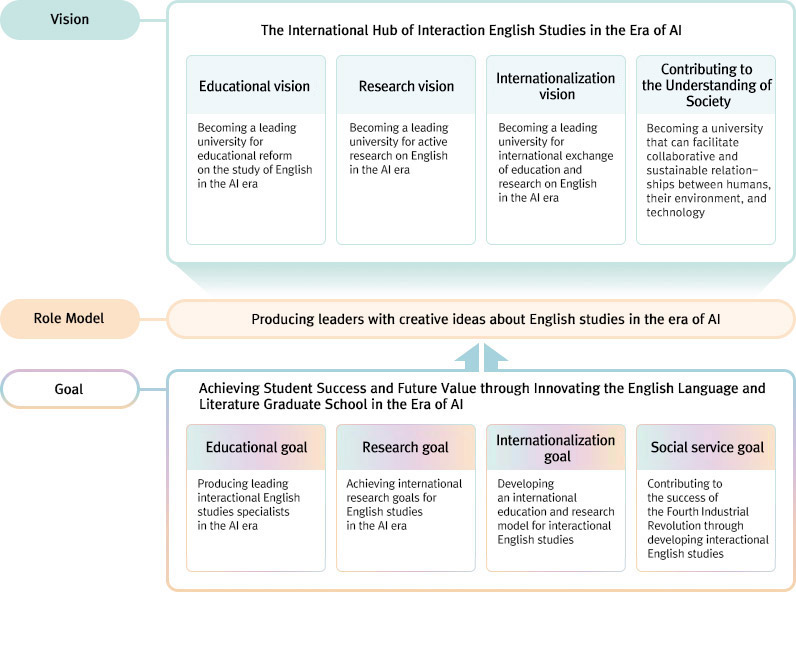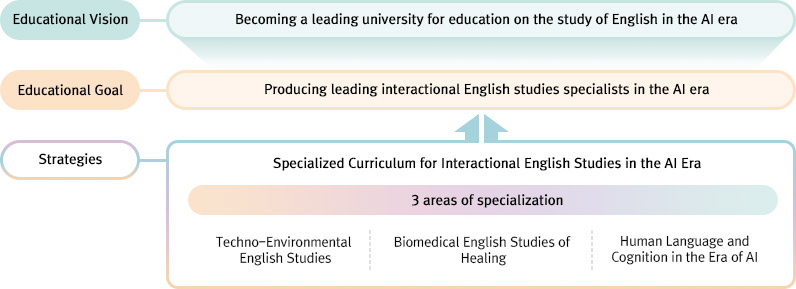1. Interaction English Studies in the Era of AI
| Our Questions |
|---|
|
Our educational research team will keep these two questions in mind to provide new directions for English Language and Literature research, and these questions will guide our development of educational methodologies that will combine a sustainable vision and a humanistic contemplation of humans and the world.
2. What Does “Interaction” Mean?
| Interaction English studies |
|---|
By analyzing the language, literature and culture of English-speaking countries, we aim to develop an English Language and Literature department that contributes to the harmonious co-existence of humanity, non-human environments, and technology. One major component of our project is imagining forms this co-existence may take in the future. |
The goal of our research education team is to respond actively to the socio-cultural changes that are resulting from the Fourth Industrial Revolution and its accompanying crisis. To achieve this goal, we will analyze various linguistic and cultural materials employing the English language in both western and eastern contexts, as well as multilingual contexts. The title “Interaction English Studies in the Era of AI” encapsulates our interests. Our goal is to cultivate future academics who will specialize in this area.
3. Vision and Goals
With the vision of making our educational research team the international hub of Interaction English Studies in the era of AI, our aim is to achieve student success through revolutionalizing our graduate school and encouraging attitudes that make integration across boundaries possible.


- 비전
-
AI 시대의 인문학을 선도하는 인터랙션 영어영문학의 국제적 거점
- 교육 비전 : AI 시대의 영어영문학 교육혁신을 선도하는 대학
- 연구 비전 : 주체적이고 영향력 있는 AI 시대의 영어영문학 연구를 선도하는 대학
- 국제화 비전 : AI 시대의 영어영문학 교육과 연구의 국제교류 선도대학
- 사회공헌 비전 : 인간, 환경, 기술의 공존과 지속가능한 포용 성장에 기여하는 대학
- 인재상
- AI 시대의 영어영문학을 선도할 도전정신과 창의역량을 지닌 인재
- 목표
-
AI 시대의 영어영문학 대학원 혁신을 통한 학생성공과 미래가치 창출
- 교육 목표 : AI 시대의 인문학을 선도하는 인터랙션 영어영문학 전문가 양성
- 연구 목표 : AI 시대의 영어영문학을 선도하는 국제적 연구역량 확보
- 국제화 목표 : 인터랙션 영어영문학의 국제적 교육과 연구 모델 구축
- 사회공헌 목표 : 인터랙션 영어영문학 발전을 통한 4차 산업혁명 성공에 기여
4. Education Vision and Goals and Three Teams
With the vison of becoming a leading English Language and Literature department—specializing in the study of humans, the environment, language, and culture in the era of AI—we have distinguished three main research areas within English studies. These areas will create academics with the critical and creative skills necessary to lead future English studies in the Korean context.


- 교육 비전
- AI 시대의 영어영문학 교육을 선도하는 대학
- 교육 목표
- AI 시대의 인문학을 선도하는 인터랙션 영어영문학 전문가 양성
- 교육 목표 실현 방안
-
AI 시대의 인터랙션 영어영문학 특성화 교육
- 3대 특성화 분야
-
- 기술-환경 영어영문학(Techno-environmental English studies)
- 치유의 의생명 영어영문학(Biomedical English studies of healing)
- AI 시대의 인간의 언어와 인지(Human language and cognition inthe era of AI
- (1) Techno-environmental English studies: By studying and teaching the environmental implications of literature and culture, in both English-speaking contexts and other linguistic contexts, we confront today’s environmental crisis and produce students with ecological problem-solving skills and the ability to reflect on the environmental consequences of human activity and technological development.
- (2) Biomedical English studies of healing: Through research and education that combine medicine, medical humanities, and psychoanalysis, we explore the value of human life and problems related to political, socio-cultural, and medical disasters; in addition, we investigate treatment methods and help students access the healing ability of language and literature.
- (3) Human language and cognition in the era of AI: Through AI and brain-imaging technology, we analyze the process of human language cognition, and we creatively bridge the gap between linguistic theory and empirical studies of international languages, language technology, and culture industries; we thereby produce students whose sophisticated understanding of language and technology will enable them to create new values.


